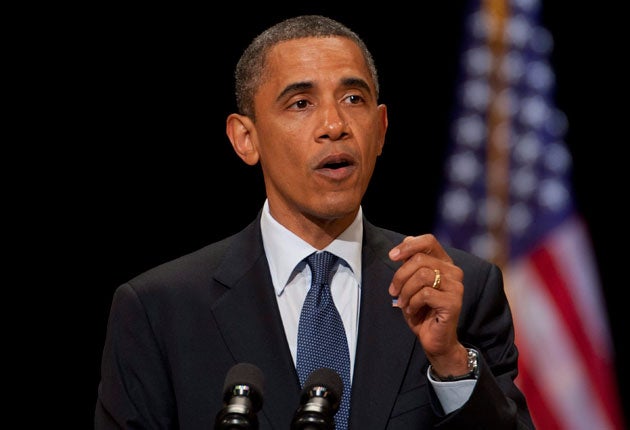Obama pledge to pull 30,000 troops out of Afghanistan risky, says Pentagon leader

Your support helps us to tell the story
From reproductive rights to climate change to Big Tech, The Independent is on the ground when the story is developing. Whether it's investigating the financials of Elon Musk's pro-Trump PAC or producing our latest documentary, 'The A Word', which shines a light on the American women fighting for reproductive rights, we know how important it is to parse out the facts from the messaging.
At such a critical moment in US history, we need reporters on the ground. Your donation allows us to keep sending journalists to speak to both sides of the story.
The Independent is trusted by Americans across the entire political spectrum. And unlike many other quality news outlets, we choose not to lock Americans out of our reporting and analysis with paywalls. We believe quality journalism should be available to everyone, paid for by those who can afford it.
Your support makes all the difference.President Barack Obama's decision to pull more than 30,000 US troops out of Afghanistan before the 2012 presidential election ran into criticism from all sides yesterday: from fellow Democrats who said it was too slow, some Republicans who accused him of acting over-hastily, and a thinly veiled warning from the Pentagon that it could endanger the hard-won gains of nearly 10 years of war.
Testifying to a Congressional committee, Admiral Mike Mullen, chairman of the Joint Chiefs of Staff, declared the decision incurred "more risk than I was originally prepared to accept". A larger force, for a longer period, was undoubtedly the safer course to ensure military success, he said.
The political reality is that Mr Obama simply cannot be seen to be doing nothing to wind down a long and unpopular war as he embarks on a tough re-election campaign, set to be dominated by an economy that, if anything, is weakening more.
His announcement triggered statements from Nato allies about their own intentions to pull out, with French President Nicolas Sarkozy saying that the French will also reduce its military presence from September.
The announcement could pave the way for a speedier withdrawal of British forces from Afghanistan. The Government yesterday spelt out its determination to pull out all combat troops by the end of 2014 and insisted the deadline was set in stone. It denies accusations that the timing has been fixed to coincide with the general election due in May 2015, insisting that Afghan forces will be ready to take over responsibility for the nation's security by then.
The plan set out by the US President in a 13-minute prime-time TV address on Wednesday evening calls for all the extra forces sent in his December 2009 surge to be recalled by next summer, leaving some 70,000 US troops in situ.
The goal is a complete handover to the Afghans by 2014, by which time, the administration hopes, President Hamid Karzai's government will have struck a deal with the Taliban.
Many experts say that target is unrealistically ambitious, but Admiral Mullen insisted yesterday that Afghan security forces were making big progress. In Kabul, President Karzai welcomed the plan for a gradual pullout and said Afghans increasingly trusted their security forces.
The initial withdrawal of 10,000 US troops is expected in two phases, with 5,000 troops coming home this summer and 5,000 more by the year's end. More than 20,000 more are to follow by September 2012.
Join our commenting forum
Join thought-provoking conversations, follow other Independent readers and see their replies
Comments